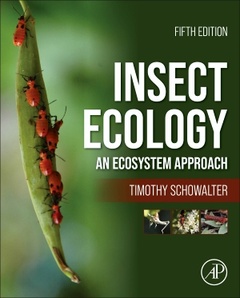Description
Insect Ecology (5th Ed.)
An Ecosystem Approach
Author: Schowalter Timothy D.
Language: English
Keywords
?Action threshold; Air conditioning systems; Alkaloids; Allee effect; Altruism; Antibiotic; Antitumor pharmaceuticals; Ants; Assimilation; Atmospheric cycle; Augmentative biological control; Autotrophs; Bees; Behavior; Behavioral Fixity Hypothesis; Biochemical arms race; Biogeographic realms; Biomass pyramid; Bray–Curtis index; Butterfly houses; Buzz pollination; Canopy arthropods; Carbon flux; Carrying capacity; Chaos theory; Chemical defense; Chronosequence; Colonization; Comminution; Compensatory growth; Competition; Conservation biological control; Coprophage; Corridor; Crop production; Decomposition; Defense; Delayed density-dependence; Deme; Density; Detoxification; Detritivory; Diffusion; Dispersal; Dispersion; Disturbance; Diversity stability hypothesis; Dung beetles; Ecosystem complexity; Ecosystem engineering; Ecosystem stability; Ecotourism; Egestion; Elemental defenses; Energy budget; Energy pyramid; Entomophagy; Environmental change; Environmental indicator; Environmental variation; Epidemiology; Evolution; Extinction; Facilitation; Feedback; Flies; Floral color; Floral scent; Foliage turnover; Folivore; Foraging; Gall-former; Generalist; Global change; Glucosinolates; Glycosides; Grazing optimization hypothesis; Growth; Heterotrophic succession; Heterotrophs; Homeostasis; Hormone analogs; Host; IPM; Ingestion; Inhibition; Insect apocalypse; Insect film festivals; Insurance hypothesis; Intermediate Disturbance Hypothesis; Intermediate disturbance hypothesis; Island biogeography; Jump dispersal; Kin selection; Kriging; Leaching; Leaf miner; Learning; Life history attributes; Litter
942 p. · 19x23.4 cm · Hardback
Description
/li>Contents
/li>Biography
/li>Comment
/li>
Insect Ecology: An Ecosystem Approach, Fifth Edition provides the most updated and comprehensive knowledge of the diversity of insect responses to environmental changes and their effects on ecosystem properties and services.
Written by an expert in the field, this book addresses ways in which insect morphology, physiology and behavior tailor their adaptation to particular environmental conditions, how those adaptations affect their responses to environmental changes, and how their responses affect ecosystem properties and the ecosystem services on which humans depend for survival. This edition also addresses recent reports of global declines in insect abundance and how these declines could affect human interests.
Insect Ecology: An Ecosystem Approach, Fifth Edition is an important resource for researchers, entomologists, ecologists, pest managers and conservationists who want to understand insect ecology and to manage insects in ways that sustain the delivery of ecosystem services. Graduate and advanced undergraduate students may also find this as a useful resource for entomology and specifically insect ecology courses.
1. Overview
SECTION I: Ecology of Individual Insects 2. Responses to Abiotic Conditions 3. Resource Acquisition 4. Resource Allocation
SECTION II: Population Ecology 5. Population Systems 6. Population Dynamics 7. Biogeography
SECTION III: Community Ecology 8. Species Interactions 9. Community Structure 10. Community Dynamics
SECTION IV: Ecosystem Level 11. Ecosystem Structure and Function 12. Herbivory 13. Pollination, Seed Predation and Seed Dispersal 14. Decomposition and Pedogenesis 15. Insects as Regulators of Ecosystem Processes
Section V. Applications and Synthesis 16. Insects and Ecosystem Services 17. Applications to Pest Management and Conservation 18. Synthesis
- The only insect ecology text that emphasizes insect effects on ecosystem properties and services, as well as evolutionary adaptations to environmental conditions
- Includes new material on long-term trends in insect abundance, addressing the so-called “insect apocalypse
- Offers crucial updates on mechanisms by which insects affect, and potentially regulate, ecosystem structure and function
- Applies ecological principles to improved management of insects for the sustainable delivery of ecosystem services
These books may interest you

Insects and Society 123.78 €



